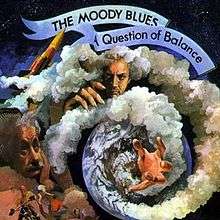A Question of Balance
| A Question of Balance | ||||
|---|---|---|---|---|
 | ||||
| Studio album by The Moody Blues | ||||
| Released | 7 August 1970 | |||
| Recorded | January – June 1970 at Decca Studios, West Hampstead, London | |||
| Genre | Progressive rock, folk rock | |||
| Length | 38:35 | |||
| Label | Threshold Records | |||
| Producer | Tony Clarke | |||
| The Moody Blues chronology | ||||
| ||||
| Singles from A Question of Balance | ||||
|
||||
| Professional ratings | |
|---|---|
| Review scores | |
| Source | Rating |
| Allmusic | |
| Rolling Stone | (favorable) [2] |
A Question of Balance is the sixth album by The Moody Blues, released in 1970. The album was an attempt by the group to strip down their well-known lush, psychedelic sound in order to be able to better perform the songs in concert. In order to be able to play as many new songs as possible from their new album live, the group decided (temporarily) to abandon their method of heavy overdubbing for A Question of Balance.
For the first time, The Moody Blues used political strife as a basis for songwriting with the British number two hit in May 1970, "Question", which dealt with the controversy resulting from the ongoing Vietnam War.
Released in 1970, the album reached #1 in the United Kingdom and #3 in the United States. However, the group would abandon the stripped-down sounds of A Question of Balance for the lusher sounds of their next two albums, Every Good Boy Deserves Favour and Seventh Sojourn.
In March 2006 the album was remastered into SACD format and repackaged with six extra tracks.
In 2008 a remaster for standard audio CD was issued with the same bonus tracks.
Original track listing
Side One
- "Question" (Justin Hayward) – 5:40 (lead singer: Justin Hayward)
- "How Is It (We Are Here)" (Mike Pinder) – 2:48 (lead singer: Mike Pinder)
- "And the Tide Rushes In" (Ray Thomas) – 2:57 (lead singer: Ray Thomas)
- "Don't You Feel Small" (Graeme Edge) – 2:40 (lead singers: Justin Hayward, John Lodge, Mike Pinder, Ray Thomas; whisper by Graeme Edge)
- "Tortoise and the Hare" (John Lodge) – 3:23 (lead singer: John Lodge)
Side Two
- "It's Up to You" (Hayward) – 3:11 (lead singer: Justin Hayward)
- "Minstrel's Song" (Lodge) – 4:27 (lead singer: John Lodge)
- "Dawning Is the Day" (Hayward) – 4:22 (lead singer: Justin Hayward)
- "Melancholy Man" (Pinder) – 5:49 (lead singer: Mike Pinder)
- "The Balance" (Edge, Thomas) – 3:33 (narrator: Mike Pinder)
2006 SACD Expanded Edition Tracks (also 2008 remaster)
Bonus tracks on the SACD version:
- "Mike's Number One (Previously unreleased)" (Pinder) – 3:36
- "Question (Alternate version)" (Hayward) – 6:08
- "Minstrel's Song (Original mix)" (Lodge) – 4:35
- "It's Up to You (Original mix)" (Hayward) – 3:19
- "Don't You Feel Small (Original mix)" (Edge) – 3:02
- "Dawning is the Day (Full original mix)" (Hayward) – 4:36
Chart positions
Album
| Year | Chart | Position |
|---|---|---|
| 1970 | UK Albums Chart[3] | 1 |
| Billboard 200 | 3 |
Singles
| Year | Single | Chart | Position |
|---|---|---|---|
| 1970 | "Question" | UK Singles Chart | 2 |
| Billboard Hot 100 | 21 |
The "Question" single released in North America was a 4:55 edit of the song, in a substantially different mix from the album version that eliminated many of the Mellotron overdubs featured in the latter.
Personnel
- Justin Hayward - vocals, acoustic & electric guitars, mandolin
- John Lodge - vocals, bass
- Ray Thomas - vocals, flute, tambourine
- Graeme Edge - drums, percussion, whispered vocal on "Don't You Feel Small"
- Mike Pinder - vocals, Mellotron, Moog synthesizer, piano, maracas, acoustic guitar
References
- ↑ Allmusic review
- ↑ Rolling Stone review
- ↑ "Number 1 Albums – 1970s". The Official Charts Company. Archived from the original on 9 February 2008. Retrieved 9 June 2011.
External links
| |||||||||